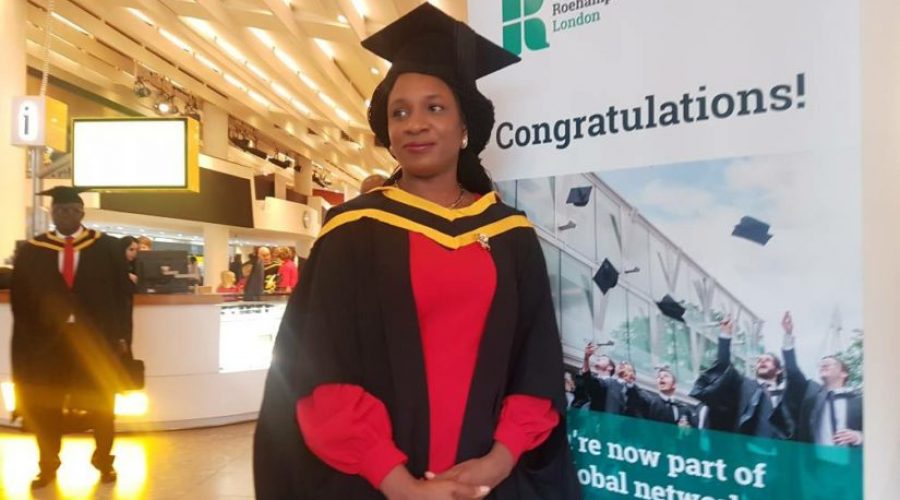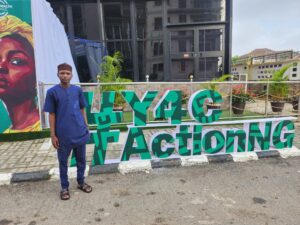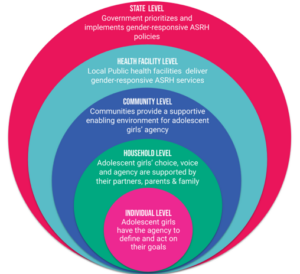By Kasey Henderson, Senior Associate Communications Manager, A360, PSI
Fifi Oluwatoyin Ogbondeminu often begins her day—enjoying a cup of tea, alone—before the sun is up. She relishes the rare moments of peace and quiet she finds in the morning as she prepares for the day ahead.
As she’ll tell you, working on A360 is almost never quiet.
Fifi is A360’s new Deputy Director, having been on the project since its inception in 2016. She brings ample experience from her role as A360 project director in Nigeria and more than 15 years of leadership experience in developing and leading health programs.
But it’s Fifi’s enthusiasm, creativity and incredible drive that jump out at you upon first meeting her. Fifi is passionate, deeply empathetic and connected to the adolescent girls we work for. Seeing the impact of A360’s work in Nigeria, and globally, keeps her motivated and believing that her team can, and will, revolutionize the way adolescents access SRHR.
This catalytic impact grows from a mindset shift, one that Fifi demonstrates every day. A360’s girl-centered approach exemplifies the inroads that can be made when we reframe how we design — and what it takes to deliver — youth-powered adolescent sexual and reproductive health (ASRH) programming at scale.
Fifi spoke with A360’s communications lead Kasey Henderson about why girls need health systems to integrate girl-centered programs, like A360, to bring contraceptive choice and access to every girl who needs it. Learn more about Fifi’s vision for the future of A360 below!
Kasey Henderson: How did you get involved in public health? What inspired you to join A360 six years ago?
Fifi Ogbondeminu: Though I grew up in a community that believed in educating girls, my culture still played a major part in defining the type of career women and girls could pursue. I wanted to change the status quo.
As a young pharmacist working in a hospital, I met girls and women dealing with a myriad of health challenges, including gender-based violence. The hospital I worked at was not set up to address these issues, and it quickly became clear that I needed, and wanted, to do more.
These haunting stories of violence and abuse were often omitted and purported as simply medical emergencies and hardly ever reported to the relevant authorities for redress. I remember a young three-year-old girl brought in by her family for medical attention. She had been severely raped, leaving her unable to walk. I found out she had been raped by her uncle, and the case was being treated as a simple family disagreement, instead of the crime it was.
That night, and many others like it, instilled in me a passion to support vulnerable people, including young girls. When the opportunity to work in the development sector presented itself in 2005, I jumped at the chance and have never looked back.
I joined A360 Nigeria in 2016 and have watched the project evolve since its inception. Hearing and seeing the impact A360 has on the girls we work with and for – and applying their insights to continually refine A360’s programs –motivates me to continue the work.
KH: You’re transitioning from your role as country lead for A360 Nigeria, to now working as A360’s global Deputy Director? Can you share anything about A360’s updated technical strategy.
FO: Over the next five years, A360 aims to sustain impact (at the consumer level by supporting girls to opt for and, if they choose, stay with contraceptive methods that work best for them), sustain implementation (by integrating A360’s global program into national health system) and sustain the value of the project by contributing to learnings to advance the global ASRH evidence base. I am hopeful and excited to see how governments across A360 countries adopt and integrate the A360 model into their ASRH response.
KH: What specifically will A360 be focusing on in 2022?
FO: We’ll focus on:
- Better understanding contraceptive discontinuation and, by 2023, see how our adaptations lead to higher contraceptive continuation rates.
- strengthening community support for girls accessing SRH services while providing more opportunities for girls to gain entrepreneurial skills and build their financial independence
- partnering with governments to integrate girl-centered approaches and strengthen health systems
KH: Five years from now, what do you hope all girls know about how contraception can support them to plan for their futures?
FO: I hope we’ve broken down all (or – if I am being realistic – at least removed many of) the socio-cultural barriers that limit girls’ choices so that girls understand that contraception not only protects their fertility but allows them to build their agency, follow their dreams and achieve better health outcomes.
Fifi Oluwatoyin Ogbondeminu is a highly enthusiastic, self-motivated, and creative Public Health Specialist with over 15 years of successful leadership experience in developing and leading health programs. She has a strong track record in applying contextual and evidence-based approaches across a variety of health areas including Adolescent Sexual and Reproductive Health. She exhibits an incredible work ethics with a proven record of aligning diverse, multi-level teams with project mission and vision, while ensuring policy compliance. Fifi holds a bachelor’s degree in Pharmacy, master’s degrees in public health and Business Administration, a fellow of the West African College of Pharmacist and currently working on a Doctorate in Public Health.
Before joining PSI as the Deputy Project Director, A360, she was the Project Director on the A360 Amplify project in Nigeria, where she worked with a multidisciplinary team to design replicable, cost effective and adaptive solutions that empowers both married and unmarried adolescent girls less than 20 years to improve their sexual and reproductive health outcomes. She also has in her portfolio several awards, accomplishments, and publications. Fifi enjoys sports and plays Tennis. She also loves reading detective and mystery novels and volunteers at her local church working with the teens.




